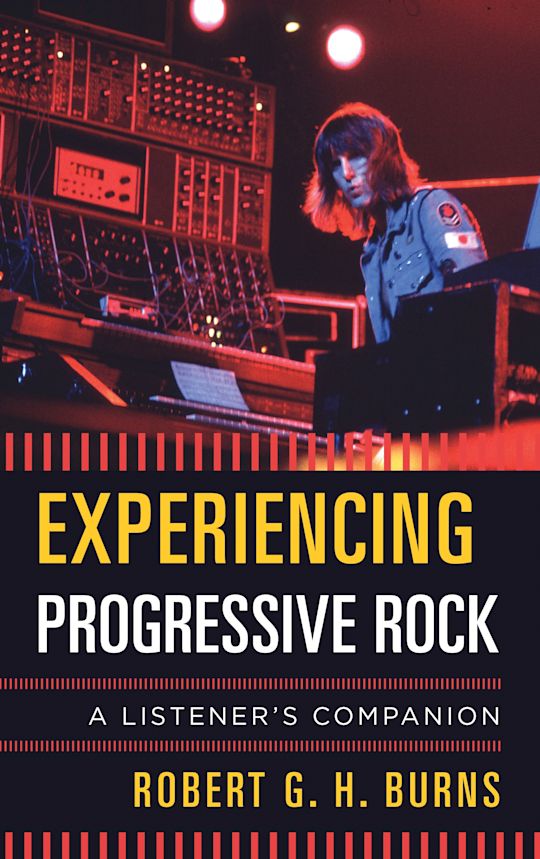- Home
- ACADEMIC
- Music & Sound Studies
- Music and Sound Studies - Other
- Experiencing Progressive Rock
You must sign in to add this item to your wishlist. Please sign in or create an account
Description
In Experiencing Progressive Rock: A Listener's Companion, Robert G. H. Burns brings together the many strands that define the "prog rock" movement of the late 1960s and early 1970s to chart the evolution of this remarkable rock tradition over the decades.
Originating in the 1960s with acts like Yes, Pink Floyd, King Crimson, The Who, Jethro Tull, Genesis, and The Moody Blues, progressive rock emerged as a response to the counterculture on both sides of the Atlantic. Prog rock drew heavily on European classical music as well as the sophisticated improvisations of American jazz to create unique fusions that defied record label and radio station categorizations. Reemerging after the 1980s, a new generation of musicians took the original influences of progressive rock and reinvented new formats within the existing style. The trend of combining influences continues to the present day, earning new audiences among the musically curious.
Burns draws on his own experiences and original interviews with members of prog rock acts such as Colosseum, Renaissance, Steve Hackett’s Genesis Revisited, past and current members of King Crimson, Steven Wilson, and Brand X, as well as several others, to provide an exciting behind-the-scenes look at this unique and ever-changing musical expression'.
Table of Contents
Chapter 2 “From the Beginning”: The Struggle for Definition
Chapter 3 Conceptuality: Embracing the Long Player and Advances in Technology in Sound Reproduction
Chapter 4 Enemies at the Door: Prog Under Threat
Chapter 5 A New Decade and a New Progressive Rock
Chapter 6 New Directions in the 1990s and 2000s
Chapter 7 Tripping the Light Fantastic: Progressive Rock and Spectacle
Chapter 8 New Life: Reuniting for Renewed Success
Chapter 9 Post-Prog: A New Struggle for Definition
Chapter 10 Conclusion: Is Contemporary Progressive Rock Driven by Musical “Progression”?
Product details
| Published | 14 May 2018 |
|---|---|
| Format | Ebook (PDF) |
| Edition | 1st |
| Extent | 1 |
| ISBN | 9798216237747 |
| Imprint | Rowman & Littlefield |
| Series | Listener's Companion |
| Publisher | Bloomsbury Publishing |
About the contributors
Reviews
-
As both a scholar and bassist, Burns melds a professional musician’s ear with a musicologist’s analytical pen to produce a tribute and history of the genre. . . The inclusion of both an extensive reading and listening lists invites the reader to indulge in complex instrumentals and reverberating Mellotrons to truly understand the meaning of progressive rock.
American Reference Books Annual
-
Progressive Music has always been full of surprises. It's the one form of music that has always embraced genre-hopping. At the end of the day, music without prejudice is what it is all about. A film for the ear... The explosion of experimentation in the 1960s enabled talented and imaginative musicians to fly and shake off the shackles of musical limitations.
Steve Hackett, guitarist for Genesis
-
A thumping good read from a thunderously good bass man.
Tim Renwick, guitarist for Eric Clapton, Elton John, Mike Oldfield, Al Stewart, and Pink Floyd
-
A comprehensive examination of Prog Rock, including interviews with band members, engineers, and producers. It also includes decryptions of lyrics and an in-depth study of the musical composition of various tracks. A well-researched fascinating read.
Craig Milliner, engineer, and producer for Peter Gabriel, Brand X, Mahavishnu Orchestra, and others
-
Burns gets inside the warp and weft of progressive rock’s intricate tapestry and shows us the hows and whys of it all. He neatly defines what makes prog-rock so different and such a product of its time, technologically and culturally. Most of all, he brings the music to life and makes you want to listen to it.
Simon Nicol, Fairport Convention


































